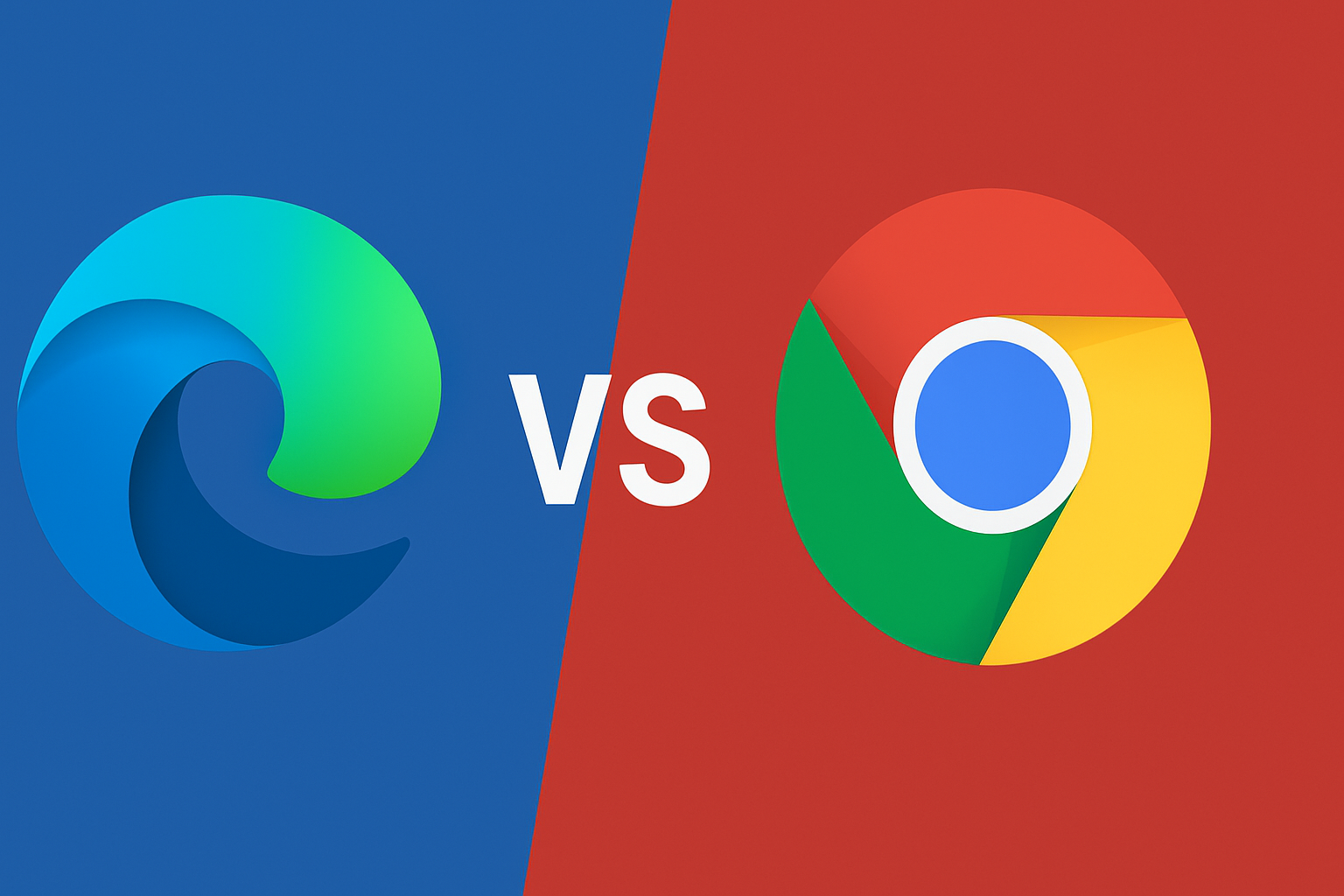Microsoft Edge and Google Chrome dominate the web browser scene, but is Microsoft Edge better than Chrome?
Both browsers originate from the same Chromium open-source project, yet they offer distinct advantages and disadvantages.
This comparison dives into performance, privacy, unique features, and user opinions to help you decide which browser fits your needs best.
Performance: Speed, Memory, and CPU
When it comes to Browse speed, both Edge and Chrome perform well in everyday use.
While some benchmarks show slight variations – Edge sometimes edges out Chrome in specific tasks, while Chrome might load pages fractionally faster in others – these differences are often negligible in real-world scenarios.
The real performance difference emerges in resource usage:
Memory (RAM)
Edge consistently uses less RAM than Chrome, especially with multiple tabs open.
Tests show Edge can use significantly less memory, sometimes roughly half of what Chrome consumes for the same number of tabs.
Edge achieves this partly through its “sleeping tabs” feature, which suspends inactive tabs to free up memory.
If you multitask heavily or have limited RAM, Edge offers a clear advantage.
CPU
Edge generally consumes less CPU power than Chrome.
Lower CPU usage means better system responsiveness and potentially longer battery life on laptops.
Edge also includes an “Efficiency mode” to further limit CPU use when needed.
Privacy and Security: How They Protect You
Protecting your online privacy and security is crucial. Here’s how the browsers compare:
Tracking Prevention
Edge features built-in Tracking Prevention with adjustable levels (Basic, Balanced, Strict) to block known trackers by default.
Chrome relies on its ongoing Privacy Sandbox initiative, which aims to replace third-party cookies with new privacy-focused technologies.
Data Collection
Edge focuses on collecting necessary data and offers controls over optional diagnostic data collection.
Chrome’s business model heavily involves user data collection (Browse history, cookies) for targeted advertising and personalization.
Security Features
Both browsers offer strong security.
Edge uses Microsoft Defender SmartScreen against malicious sites and downloads, while Chrome employs Google Safe Browse.
Chrome typically releases security updates more frequently than Edge.
Edge also offers an “Enhanced Security Mode” for extra protection on unfamiliar sites.
Standout Features: What Makes Each Unique?
Beyond the basics, each browser offers unique capabilities:
Microsoft Edge:
- Collections: Easily save and organize webpages, text, and images for projects, syncing across devices and exporting to Office apps like Word and Excel.
- Vertical Tabs: Display tabs vertically on the side, improving navigation and readability, especially with many tabs open on widescreen monitors.
- Microsoft Integration: Offers deep integration with Windows and Microsoft 365 services like OneDrive and Outlook. Includes features like a built-in VPN (Edge Secure Network) and the AI assistant, Copilot.
Google Chrome:
- Vast Extension Library: Access the massive Chrome Web Store, offering over 130,000 extensions to customize nearly every aspect of your Browse. While Edge supports Chrome extensions, Chrome’s library is more established.
- Cross-Device Sync: Seamlessly syncs bookmarks, history, passwords, settings, and more across all devices signed into your Google Account.
- Google Ecosystem Integration: Provides tight integration with Google services like Gmail, Drive, Docs, and Search, offering a streamlined experience for heavy Google users.
The Verdict: User and Expert Opinions
Users praise Edge for its speed and efficiency, especially its low RAM usage, along with features like Collections and vertical tabs.
Criticisms sometimes mention feature bloat.
Chrome users love its speed, simplicity, and extensive extension library, plus Google service integration.
However, high resource consumption and privacy concerns are common complaints.
Experts agree that both are excellent browsers, often concluding the “best” choice depends on individual priorities.
Edge often gets kudos for resource efficiency and unique features, while Chrome is recognized for its speed, extensions, and ecosystem integration.
You can find detailed comparisons on tech sites like ZDNet.
Which Browser Should You Choose?
- Choose Microsoft Edge if: You prioritize low memory/CPU usage, want strong built-in privacy controls, use Windows extensively, find features like Collections useful, or are invested in the Microsoft ecosystem.
- Choose Google Chrome if: You rely heavily on Google services, need the widest possible selection of browser extensions, value rapid security updates, or prefer seamless cross-device syncing.
Ultimately, both Microsoft Edge and Google Chrome are powerful, capable browsers in 2024.
Edge has significantly closed the gap, excelling in efficiency and innovative features.
Chrome remains the market leader, favoured for its extensions and Google integration.
The best way to decide is to try both and see which one best suits your workflow and priorities.
Read more: Best way to customize Microsoft Edge Homepage
IT Security / Cyber Security Experts.
Technology Enthusiasm.
Love to read, test and write about IT, Cyber Security and Technology.
The Geek coming from the things I love and how I look.

